2024届高三英语二轮复习非谓语动词课件(共52张PPT)
文档属性
| 名称 | 2024届高三英语二轮复习非谓语动词课件(共52张PPT) |  | |
| 格式 | pptx | ||
| 文件大小 | 2.2MB | ||
| 资源类型 | 教案 | ||
| 版本资源 | 人教版(2019) | ||
| 科目 | 英语 | ||
| 更新时间 | 2024-01-19 15:35:28 | ||
图片预览






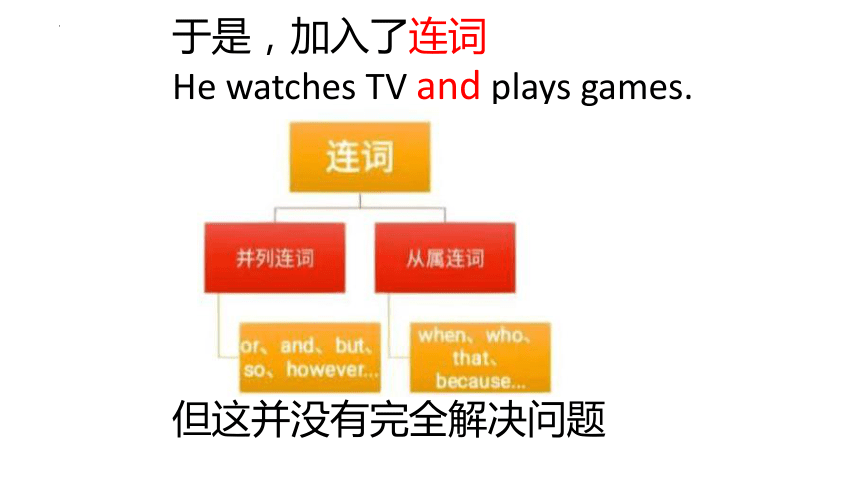

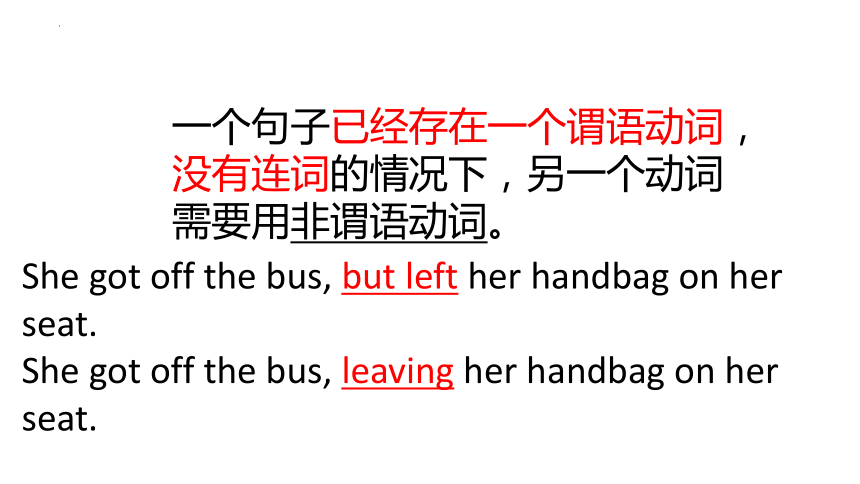
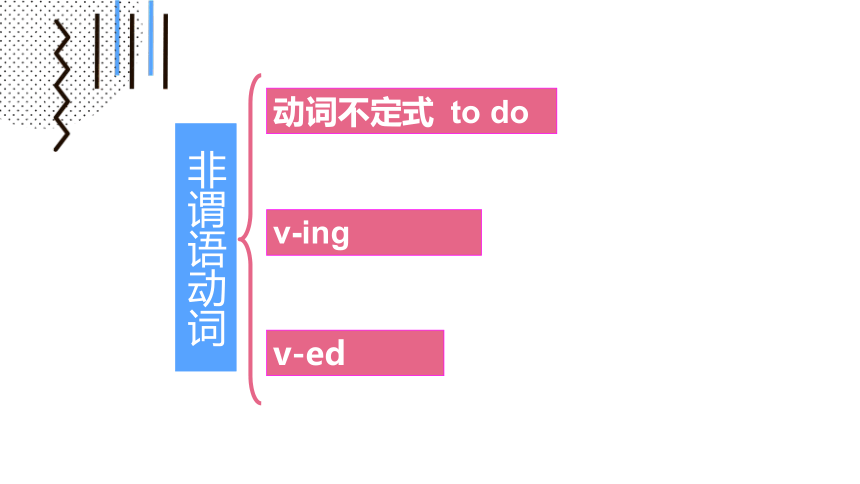
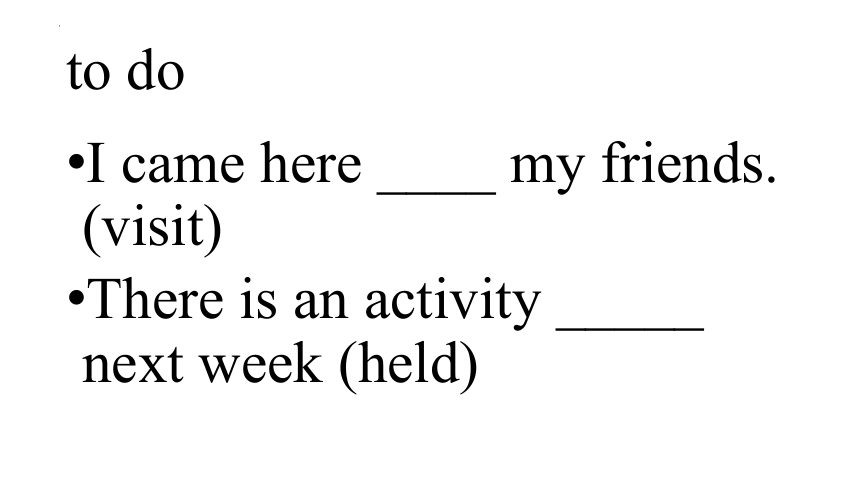
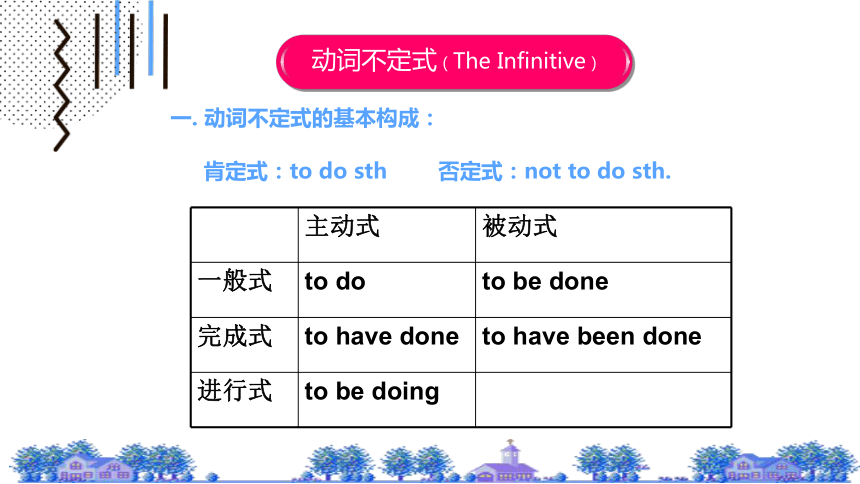
文档简介
(共52张PPT)
非谓语例句
什么是非谓语?
He watches TV.
主
谓
宾
谓语:说明主语所做的动作或具有的特征和状态。它有人称、数、时态和语态的变化。
e.g. He works.
He takes care of the baby.
He will go to Shanghai.
He didn’t go to Shanghai.
He has gone to Shanghai.
You are students.
You look smart.
单谓语或动词短语
情态动词/助动词+ v.
系动词+表语
我要边看电视边玩游戏怎么办?
于是,加入了连词
He watches TV and plays games.
但这并没有完全解决问题
我看电视,玩游戏,吃零食,但我不想加连词,怎么办?
一个句子已经存在一个谓语动词,没有连词的情况下,另一个动词需要用非谓语动词。
She got off the bus, but left her handbag on her seat.
She got off the bus, leaving her handbag on her seat.
非谓语动词
v-ing
v-ed
动词不定式 to do
to do
I came here ____ my friends. (visit)
There is an activity _____ next week (held)
动词不定式(The Infinitive)
一. 动词不定式的基本构成:
肯定式:to do sth 否定式:not to do sth.
主动式 被动式
一般式 to do to be done
完成式 to have done to have been done
进行式 to be doing
to be doing
I pretended ________ when my mother came into the room.
to have done
The scientist claims to have identified new link between diet and cancer.
看学案左下角
只接不定式作宾语的动词
learn, want, hope, wish, refuse, decide, determind, manage, pretend, offer, promise, beg, attempt, intend.......
主语+谓语+宾语
S + V + O
不定式 (to do)
(1)作主语
不定式做主语时,可以直接放在谓语动词之前。
To see is to believe.
Not to get there in time is your fault.
注:常用it做形式主语,将to do放在后面,使句子保持平衡,避免”头重脚轻 “
不定式做主语常表示某次具体的行为或将来的动作。
e.g. To go abroad is his dream.
To visit China is my next goal.
To be an actress is my dream.
It is my dream to be an actress.
主语+谓语+宾语
S + V + O
不定式 (to do)
句型:It is adj. for/of sb. to do sth.
It is + adj + for sb to do sth
It is + adj + of sb to do sth
(是形容人的品质的 )
(是形容事物的性质的 )
It is easy ______ me to finish this work before ten.
It is very kind ___ you to give me some help.
=You are very kind to give me some help.
for
of
It's impolite ___ you to speak to the teacher like that.
of
=you are impolite to speak to the teacher like that.
I find/feel to work with him interesting .
I find/feel it interesting to work with him.
句型:S+ find/think/feel/make/ consider/believe…..
+it +adj/n+ to do sth.
1.I feel it our duty to protect the environment.
2.We think it important to obey the law.
3.I find it impossible to finish so much
homework in a day.
注意: it作形式宾语
His dream is to be a scientist.
Her job is to look after the patients.
(3)作表语
系动词be, appear, seem, prove后用to do形式做表语;
be to do ,be about to do结构表将来时:
He is to marry Rose.
①We ____________ the large factory.
②I was just about ____________ (leave) the office
when the phone rang.
③The girl seems _________ (be) unhappy.
to leave
are to visit
to be
常见的接带to的不定式做宾补的动词:看学案第二章左上角
get,ask,force,order,tell,invite,allow,wish,want,like,expect,advise,beg,cause,persuade,teach,warn,hate,permit,remind, forbid,encourage, call on, wait for等
eg.She asked me to stay there.
Please allow me to introduce Mr. White to you.
He required me to work with him.
一感:feel
二听:hear, listen to
三让:let, make, have
四看:see, watch, notice, observe
某人做某事的全过程或某事发生的全过程,强调事物的发生和结束。
不带to的不定式做宾补的动词:
eg.I often hear them sing this song.
Did you notice anyone come in
I would have him wait for me for a long time.
注意: 当这类动词转为被动语态时, 其后的不定式则要加上to
① He is often heard ________ the song·
②He was seen _______ the room.
to sing
to enter
感官
使役动词
with复合结构
看学案第二张左下角
With music ________ (go on), I can’t focus on my study.
I saw an old man _____ down by a car. (knock)
I hear an old man______on the door. (knock)
With problem ______ (settle), I feel relaxed.
be said/ believed/ thought/ known/ reported to do
be said/ believed/ thought/ known/ reported to have done
序数词,最高级,the last, the only to do
ability to do; the attempt to do; decision to do; determination to do......
have sth to do
不定式做目的状语,相当于用in order to,so as to引导的目的状语
He got up early to catch the first bus.
To get/ In order to get a good seat, she arrived early.
不定式作结果状语
He is brave enough to go out alone at night.
Heis too little to drive the car.
Jane hurried back, only to find the train had gone.
必 背
常见的带介词to的短语:
be used to 习惯 get down to 着手做 be addicted to 沉溺于 devote oneself to 献身于
lead to 导致 look forward to 盼望 stick to 坚持 pay attention to 注意
when it comes to 当谈到
contribute to 有助于
doing、 not doing
_____ the teacher, two students came to the classroom. (follow)
①Teaching is my full-time job.
②Talking is easier than doing.
③It’s useless taking this kind of medicine.
(it 做形式主语)
注意:动名词作主语时,谓语动词一律用单数。
动名词的句法功能
作主语
只接动名词作宾语的动词 看学案右边
consider, practice, imagine, mind, avoid, escape, risk, enjoy, appreciate, admit, postpone......
既可接不定式,又可接动名词
go on
mean
regret
can’t help
remember
forget
3.有些动词既可后接动名词也可接不定式作宾语。(有区别)
(1)stop doing/to do
stop to do 停下来去做另一件事
stop doing 停止正在做的某事。
eg. They stop to smoke.他们停下来吸烟。
I must stop smoking.我必须戒烟了
The scientist stopped __ to me though he was busy.
A. talking B. to talk
C. to have talk D. having talk
3.有些动词既可后接动名词也可接不定式作宾语。(有区别)
(2)try doing/to do
try to do sth 努力做某事
try doing sth 试着做某事
He tried_______up but failed.Let’s try_______him about the sad news.
A. standing;to tell B. to stand;telling
C. to stand;to tell D. standing;telling
eg. Although maths is difficult, I will try to study it
The machine couldn’t work. Let’s try repairing it.
3.有些动词既可后接动名词也可接不定式作宾语。(有区别)
(3)remember/forget/regret
eg. The light in the office is still on.
①He forgot to turn it off.
to do 未发生
doing 已发生
②He forgot turning the light off.
(没关灯)
(已关灯)
①Remember to see your teacher after school.
②Don't you remember seeing the teacher before
记得 / 忘记 / 遗憾
①I regret to inform you that you are dismissed.
②I regret not taking his advide.
3.有些动词既可后接动名词也可接不定式作宾语。(有区别)
(4)go on doing/to do
①go on to do sth 继续去做另外一件事
②go on doing sth 继续做同一件事
Shall we go on ________the next question
A. discuss B. discussing
C. to discuss D. discussed
3.有些动词既可后接动名词也可接不定式作宾语。(有区别)
(5)mean doing/to do
①mean to do sth 打算做(主语人)
②mean doing sth 意味着(主语物)
I didn't mean _______you.
A. to hurt B. hurting C.hurted D.hurt
3.有些动词既可后接动名词也可接不定式作宾语。(有区别)
(6)can't help doing/to do
①can't help to do sth 不能帮忙做某事
eg.I can't help to wash the clothes.
②can't help doing sth 情不自禁做某事
eg.She couldn't help crying when she heard the news.
1.We couldn’t help _____ after we heard the funny story.
A. to laugh B. laughing C. laughs D. laughed
2.She can’t help ____ the house because she’s busy
making a cake.
A. to clean B. cleaning C. cleaned D. being cleaned
4. need, require, want,be worth作“需要”解时, 后接动词-ing形式作宾语, 主动形式表示被动意义, 相当于to be done。如:
needs
requires
wants
②His coat wants cleaning/to be cleaned.
③This book is worth reading twice.
repairing
to be repaired.
①The radio
主动表被动
need/ require/ desire doing = to be done
be worth doing
being done
“正在被”
Being exposed to sunlight is good for our bone.
The boy managed to escape being punished.
having done
_____ in college for 4 years, he was ready to find a job. (study)
______ nearly all our money, we couldn’t afford to stay at hotel. (spend)
done
_____ in 1911, the bridge attracted many visitors. (finish)
Developing country
Developed country
boiled water
boiling water
1.语态上:现在分词表主动,过去分词表被动
She has a smiling face.
A broken mirror cannot be repaired.
2.时态上:现在分词表进行,过去分词表完成
Developing country、 boiling water
Developed country 、 boiled water
现在分词与过去分词的区别
ing表示“令人…的”,
ed表示“感到…”, 如:
The news was exciting.(主语是物)
She is excited at the news.(主语是人)
ing做状语
When reading the new book, he nodded from time to time.
When asked why he did it, he said it was his duty.
Putting your heart into your study, you will succeed. (__ your heart into your study and you will succeed.)
Not receiving any answer, he decided to write again.
状语
They entered the classroom, laughing and talking.
Trying many times, he failed again.
The fire have lasted for months, leaving lots of animals homeless.
固定短语
be situated in
be located in
be absorbed in
be lost in
be buried in
be dressed in
be faced with
be involved in
be based on
be addicted to
be devoted to
be determined to do
be known for
be compared with
generally speaking
frankly speaking
Given that
to tell you the truth
....
没有被动的词
系动词
date back to、date from
belong to
consist of
①谓语or非谓语
②是否是目的,是否有固定短语
③找逻辑主语
④主动or被动
⑤之前之中之后(判断时态)
⑥肯定否定
非谓语例句
什么是非谓语?
He watches TV.
主
谓
宾
谓语:说明主语所做的动作或具有的特征和状态。它有人称、数、时态和语态的变化。
e.g. He works.
He takes care of the baby.
He will go to Shanghai.
He didn’t go to Shanghai.
He has gone to Shanghai.
You are students.
You look smart.
单谓语或动词短语
情态动词/助动词+ v.
系动词+表语
我要边看电视边玩游戏怎么办?
于是,加入了连词
He watches TV and plays games.
但这并没有完全解决问题
我看电视,玩游戏,吃零食,但我不想加连词,怎么办?
一个句子已经存在一个谓语动词,没有连词的情况下,另一个动词需要用非谓语动词。
She got off the bus, but left her handbag on her seat.
She got off the bus, leaving her handbag on her seat.
非谓语动词
v-ing
v-ed
动词不定式 to do
to do
I came here ____ my friends. (visit)
There is an activity _____ next week (held)
动词不定式(The Infinitive)
一. 动词不定式的基本构成:
肯定式:to do sth 否定式:not to do sth.
主动式 被动式
一般式 to do to be done
完成式 to have done to have been done
进行式 to be doing
to be doing
I pretended ________ when my mother came into the room.
to have done
The scientist claims to have identified new link between diet and cancer.
看学案左下角
只接不定式作宾语的动词
learn, want, hope, wish, refuse, decide, determind, manage, pretend, offer, promise, beg, attempt, intend.......
主语+谓语+宾语
S + V + O
不定式 (to do)
(1)作主语
不定式做主语时,可以直接放在谓语动词之前。
To see is to believe.
Not to get there in time is your fault.
注:常用it做形式主语,将to do放在后面,使句子保持平衡,避免”头重脚轻 “
不定式做主语常表示某次具体的行为或将来的动作。
e.g. To go abroad is his dream.
To visit China is my next goal.
To be an actress is my dream.
It is my dream to be an actress.
主语+谓语+宾语
S + V + O
不定式 (to do)
句型:It is adj. for/of sb. to do sth.
It is + adj + for sb to do sth
It is + adj + of sb to do sth
(是形容人的品质的 )
(是形容事物的性质的 )
It is easy ______ me to finish this work before ten.
It is very kind ___ you to give me some help.
=You are very kind to give me some help.
for
of
It's impolite ___ you to speak to the teacher like that.
of
=you are impolite to speak to the teacher like that.
I find/feel to work with him interesting .
I find/feel it interesting to work with him.
句型:S+ find/think/feel/make/ consider/believe…..
+it +adj/n+ to do sth.
1.I feel it our duty to protect the environment.
2.We think it important to obey the law.
3.I find it impossible to finish so much
homework in a day.
注意: it作形式宾语
His dream is to be a scientist.
Her job is to look after the patients.
(3)作表语
系动词be, appear, seem, prove后用to do形式做表语;
be to do ,be about to do结构表将来时:
He is to marry Rose.
①We ____________ the large factory.
②I was just about ____________ (leave) the office
when the phone rang.
③The girl seems _________ (be) unhappy.
to leave
are to visit
to be
常见的接带to的不定式做宾补的动词:看学案第二章左上角
get,ask,force,order,tell,invite,allow,wish,want,like,expect,advise,beg,cause,persuade,teach,warn,hate,permit,remind, forbid,encourage, call on, wait for等
eg.She asked me to stay there.
Please allow me to introduce Mr. White to you.
He required me to work with him.
一感:feel
二听:hear, listen to
三让:let, make, have
四看:see, watch, notice, observe
某人做某事的全过程或某事发生的全过程,强调事物的发生和结束。
不带to的不定式做宾补的动词:
eg.I often hear them sing this song.
Did you notice anyone come in
I would have him wait for me for a long time.
注意: 当这类动词转为被动语态时, 其后的不定式则要加上to
① He is often heard ________ the song·
②He was seen _______ the room.
to sing
to enter
感官
使役动词
with复合结构
看学案第二张左下角
With music ________ (go on), I can’t focus on my study.
I saw an old man _____ down by a car. (knock)
I hear an old man______on the door. (knock)
With problem ______ (settle), I feel relaxed.
be said/ believed/ thought/ known/ reported to do
be said/ believed/ thought/ known/ reported to have done
序数词,最高级,the last, the only to do
ability to do; the attempt to do; decision to do; determination to do......
have sth to do
不定式做目的状语,相当于用in order to,so as to引导的目的状语
He got up early to catch the first bus.
To get/ In order to get a good seat, she arrived early.
不定式作结果状语
He is brave enough to go out alone at night.
Heis too little to drive the car.
Jane hurried back, only to find the train had gone.
必 背
常见的带介词to的短语:
be used to 习惯 get down to 着手做 be addicted to 沉溺于 devote oneself to 献身于
lead to 导致 look forward to 盼望 stick to 坚持 pay attention to 注意
when it comes to 当谈到
contribute to 有助于
doing、 not doing
_____ the teacher, two students came to the classroom. (follow)
①Teaching is my full-time job.
②Talking is easier than doing.
③It’s useless taking this kind of medicine.
(it 做形式主语)
注意:动名词作主语时,谓语动词一律用单数。
动名词的句法功能
作主语
只接动名词作宾语的动词 看学案右边
consider, practice, imagine, mind, avoid, escape, risk, enjoy, appreciate, admit, postpone......
既可接不定式,又可接动名词
go on
mean
regret
can’t help
remember
forget
3.有些动词既可后接动名词也可接不定式作宾语。(有区别)
(1)stop doing/to do
stop to do 停下来去做另一件事
stop doing 停止正在做的某事。
eg. They stop to smoke.他们停下来吸烟。
I must stop smoking.我必须戒烟了
The scientist stopped __ to me though he was busy.
A. talking B. to talk
C. to have talk D. having talk
3.有些动词既可后接动名词也可接不定式作宾语。(有区别)
(2)try doing/to do
try to do sth 努力做某事
try doing sth 试着做某事
He tried_______up but failed.Let’s try_______him about the sad news.
A. standing;to tell B. to stand;telling
C. to stand;to tell D. standing;telling
eg. Although maths is difficult, I will try to study it
The machine couldn’t work. Let’s try repairing it.
3.有些动词既可后接动名词也可接不定式作宾语。(有区别)
(3)remember/forget/regret
eg. The light in the office is still on.
①He forgot to turn it off.
to do 未发生
doing 已发生
②He forgot turning the light off.
(没关灯)
(已关灯)
①Remember to see your teacher after school.
②Don't you remember seeing the teacher before
记得 / 忘记 / 遗憾
①I regret to inform you that you are dismissed.
②I regret not taking his advide.
3.有些动词既可后接动名词也可接不定式作宾语。(有区别)
(4)go on doing/to do
①go on to do sth 继续去做另外一件事
②go on doing sth 继续做同一件事
Shall we go on ________the next question
A. discuss B. discussing
C. to discuss D. discussed
3.有些动词既可后接动名词也可接不定式作宾语。(有区别)
(5)mean doing/to do
①mean to do sth 打算做(主语人)
②mean doing sth 意味着(主语物)
I didn't mean _______you.
A. to hurt B. hurting C.hurted D.hurt
3.有些动词既可后接动名词也可接不定式作宾语。(有区别)
(6)can't help doing/to do
①can't help to do sth 不能帮忙做某事
eg.I can't help to wash the clothes.
②can't help doing sth 情不自禁做某事
eg.She couldn't help crying when she heard the news.
1.We couldn’t help _____ after we heard the funny story.
A. to laugh B. laughing C. laughs D. laughed
2.She can’t help ____ the house because she’s busy
making a cake.
A. to clean B. cleaning C. cleaned D. being cleaned
4. need, require, want,be worth作“需要”解时, 后接动词-ing形式作宾语, 主动形式表示被动意义, 相当于to be done。如:
needs
requires
wants
②His coat wants cleaning/to be cleaned.
③This book is worth reading twice.
repairing
to be repaired.
①The radio
主动表被动
need/ require/ desire doing = to be done
be worth doing
being done
“正在被”
Being exposed to sunlight is good for our bone.
The boy managed to escape being punished.
having done
_____ in college for 4 years, he was ready to find a job. (study)
______ nearly all our money, we couldn’t afford to stay at hotel. (spend)
done
_____ in 1911, the bridge attracted many visitors. (finish)
Developing country
Developed country
boiled water
boiling water
1.语态上:现在分词表主动,过去分词表被动
She has a smiling face.
A broken mirror cannot be repaired.
2.时态上:现在分词表进行,过去分词表完成
Developing country、 boiling water
Developed country 、 boiled water
现在分词与过去分词的区别
ing表示“令人…的”,
ed表示“感到…”, 如:
The news was exciting.(主语是物)
She is excited at the news.(主语是人)
ing做状语
When reading the new book, he nodded from time to time.
When asked why he did it, he said it was his duty.
Putting your heart into your study, you will succeed. (__ your heart into your study and you will succeed.)
Not receiving any answer, he decided to write again.
状语
They entered the classroom, laughing and talking.
Trying many times, he failed again.
The fire have lasted for months, leaving lots of animals homeless.
固定短语
be situated in
be located in
be absorbed in
be lost in
be buried in
be dressed in
be faced with
be involved in
be based on
be addicted to
be devoted to
be determined to do
be known for
be compared with
generally speaking
frankly speaking
Given that
to tell you the truth
....
没有被动的词
系动词
date back to、date from
belong to
consist of
①谓语or非谓语
②是否是目的,是否有固定短语
③找逻辑主语
④主动or被动
⑤之前之中之后(判断时态)
⑥肯定否定
